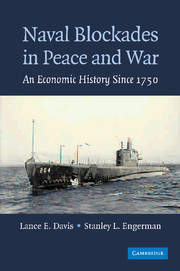Book contents
- Frontmatter
- Contents
- Preface
- 1 Introduction: “Thou Shalt Not Pass”
- 2 Britain, France, and Napoleon's Continental System, 1793–1815
- 3 The United States versus Great Britain, 1776–1815
- 4 The North Blockades the Confederacy, 1861–1865
- 5 International Law and Naval Blockades during World War I: Britain, Germany, and the United States: Traditional Strategies versus the Submarine
- 6 Legal and Economic Aspects of Naval Blockades: The United States, Great Britain, and Germany in World War II
- 7 The American Submarine and Aerial Mine Blockade of the Japanese Home Islands, 1941–1945
- 8 Blockades without War: From Pacific Blockades to Sanctions
- 9 Blockades, War, and International Law: What It All Means
- Conclusion
- Index
5 - International Law and Naval Blockades during World War I: Britain, Germany, and the United States: Traditional Strategies versus the Submarine
Published online by Cambridge University Press: 18 August 2009
- Frontmatter
- Contents
- Preface
- 1 Introduction: “Thou Shalt Not Pass”
- 2 Britain, France, and Napoleon's Continental System, 1793–1815
- 3 The United States versus Great Britain, 1776–1815
- 4 The North Blockades the Confederacy, 1861–1865
- 5 International Law and Naval Blockades during World War I: Britain, Germany, and the United States: Traditional Strategies versus the Submarine
- 6 Legal and Economic Aspects of Naval Blockades: The United States, Great Britain, and Germany in World War II
- 7 The American Submarine and Aerial Mine Blockade of the Japanese Home Islands, 1941–1945
- 8 Blockades without War: From Pacific Blockades to Sanctions
- 9 Blockades, War, and International Law: What It All Means
- Conclusion
- Index
Summary
INTRODUCTION
World War I saw blockades assume a major role in the strategy adopted by both coalitions of belligerent powers. In some ways, this role merely reflected a continuation of the strategies adopted by the naval forces in earlier European conflicts; but by this time there was one crucial change in technology – the German military's expanded use of the submarine as a weapon of war. Because the submarine had not been a subject included in the earlier formulations of international law, and, as it posed a new set of military and moral problems, over the course of the war, new rules for international behavior were brought to the table, but, even in 1919, there was no satisfactory resolution. The submarine was crucial to the German war effort; but, ultimately, it did not accomplish as much as did the Allies' more traditional blockade. The submarine, nevertheless, did lead to a number of important strategic changes in the organization of, and the responses to, blockades; and it was instrumental in shaping policies that would become critical during World War II.
Because Germany and, even more so, Britain, depended on imports for a significant portion of their food supply, the threat of blockades was an important consideration in the design of domestic policies. Problems with maintaining or increasing domestic production, as well as those arising from attempts to keep imports flowing, confronted both powers, as did issues involving the restriction of unnecessary consumption, if that latter goal was possible to achieve at all.
- Type
- Chapter
- Information
- Naval Blockades in Peace and WarAn Economic History since 1750, pp. 159 - 238Publisher: Cambridge University PressPrint publication year: 2006

